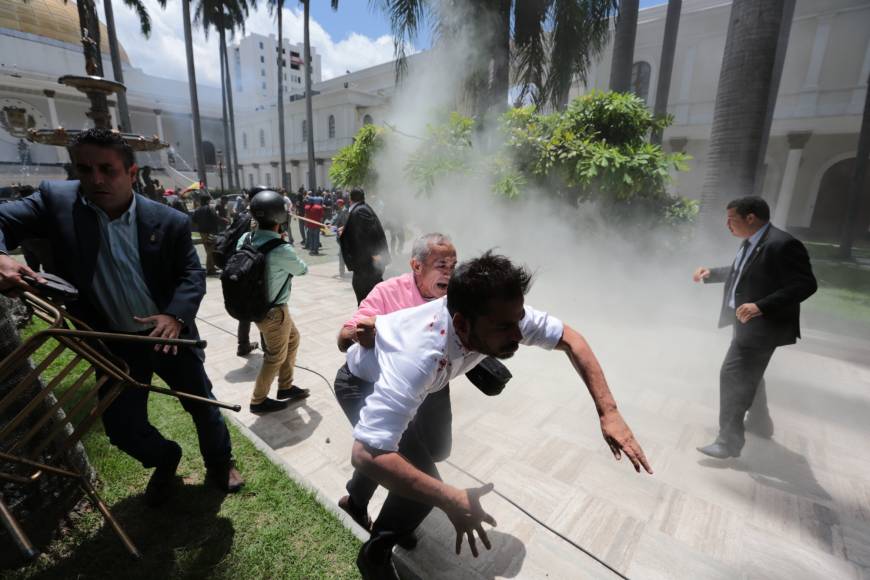State socialism is the cooptation and consumption of popular energy and liberation movements into a brutal and exploitative structure of party control, self-feeding state structures and authortarian power politics. It is the graveyard of social change, and the human costs that it exacts range from waste and malinvestment to degenerative, systemic social and economic collapse. What has happened in Venezuela is a long, slow-motion horror show illustrating how state socialism feeds on itself, and eventually subdues any aspiration of popular empowerment under the weight of a brutal, desperately feeding vampire of bureaucratic state-capitalism.
Venezuela's epic shortages are nothing new at this point. No diapers or car parts or aspirin — it's all been well documented. But now the country is at risk of running out of money itself.
In a tale that highlights the chaos of unbridled inflation, Venezuela is scrambling to print new bills fast enough to keep up with the torrid pace of price increases. Most of the cash, like nearly everything else in the oil-exporting country, is imported. And with hard currency reserves sinking to critically low levels, the central bank is doling out payments so slowly to foreign providers that they are foregoing further business.
Venezuela, in other words, is now so broke that it may not have enough money to pay for its money.
. . . Last month, De La Rue, the world's largest currency maker, sent a letter to the central bank complaining that it was owed $71 million and would inform its shareholders if the money were not forthcoming. The letter was leaked to a Venezuelan news website and confirmed by Bloomberg News.
It's an unprecedented case in history that a country with such high inflation cannot get new bills,
said Jose Guerra, an opposition law maker and former director of economic research at the central bank. Late last year, the central bank ordered more than 10 billion bank notes, surpassing the 7.6 billion the U.S. Federal Reserve requested this year for an economy many times the size of Venezuela's.
–Andrew Rosati, Venezuela Doesn’t Have Enough Money to Pay for Its Money
Bloomberg (27 April 2016)
The Venezuelan Boli-Bureaucracy survives by feeding off oil revenues and redistributing part of the take to popular subsidy programs for basic goods (especially food and gasoline). But as they’ve become increasingly unable to find the money to keep those programs functioning, they’ve responded by escalating state confiscation of businesses and inflating the currency to pay off looming bills. As the value of the bolivar has cratered, prices on those basic goods have skyrocketed; since the legitimacy of the Boli-Bureaucracy depends on keeping basic goods affordable to the poor, they responded by blaming greedy merchants and instituted rigid price controls on food, medicine, batteries, deodorant, diapers, etc. etc. etc. Predictably, the effect of price controls in the midst of sky-high inflation was that people rushed to buy everything they could before their wages became even more worthless, and stores sold what they had but couldn’t afford to import any more.[] So now the government inflicts massive shortages on the people it claims to be aiding, and it responds by enacting increasingly draconian efforts to force more goods to be brought to market and to monitor shopping and limit the quantities that people can buy. The degenerative process has gotten so bad that even the government’s ability to pay for its own inflation is breaking down. The spiraling, swallowed-the-goat-to-catch-the-cat, swallowed-the-cat-to-catch-the-bird process of complete systemic breakdown would be comical, if its human costs weren’t so grimly, horribly real. From a recent overview article in The Atlantic, whose contents are as horrifying as they are predictable to anyone who has been following the situation over the last few years:
… In the last two years Venezuela has experienced the kind of implosion that hardly ever occurs in a middle-income country like it outside of war. Mortality rates are skyrocketing; one public service after another is collapsing; triple-digit inflation has left more than 70 percent of the population in poverty; an unmanageable crime wave keeps people locked indoors at night; shoppers have to stand in line for hours to buy food; babies die in large numbers for lack of simple, inexpensive medicines and equipment in hospitals, as do the elderly and those suffering from chronic illnesses.
But why? It's not that the country lacked money. Sitting atop the world's largest reserves of oil at the tail end of a frenzied oil boom, the government led first by Chavez and, since 2013, by Maduro, received over a trillion dollars in oil revenues over the last 17 years. It faced virtually no institutional constraints on how to spend that unprecedented bonanza. It's true that oil prices have since fallen—a risk many people foresaw, and one that the government made no provision for—but that can hardly explain what's happened: Venezuela's garish implosion began well before the price of oil plummeted. Back in 2014, when oil was still trading north of $100 per barrel, Venezuelans were already facing acute shortages of basic things like bread or toiletries.
The real culprit is chavismo, the ruling philosophy named for Chavez and carried forward by Maduro, and its truly breathtaking propensity for mismanagement (the government plowed state money arbitrarily into foolish investments); institutional destruction (as Chavez and then Maduro became more authoritarian and crippled the country's democratic institutions); nonsense policy-making (like price and currency controls); and plain thievery (as corruption has proliferated among unaccountable officials and their friends and families).
A case in point is the price controls, which have expanded to apply to more and more goods: food and vital medicines, yes, but also car batteries, essential medical services, deodorant, diapers, and, of course, toilet paper. The ostensible goal was to check inflation and keep goods affordable for the poor, but anyone with a basic grasp of economics could have foreseen the consequences: When prices are set below production costs, sellers can't afford to keep the shelves stocked. Official prices are low, but it's a mirage: The products have disappeared.
When a state is in the process of collapse, dimensions of decay feed back on each other in an intractable cycle. Populist giveaways, for example, have fed the country's ruinous flirtation with hyperinflation; the International Monetary Fund now projects that prices will rise by 720 percent this year and 2,200 percent in 2017. The government virtually gives away gasoline for free, even after having raised the price earlier this year. As a result of this and similar policies, the state is chronically short of funds, forced to print ever more money to finance its spending. Consumers, flush with cash and chasing a dwindling supply of goods, are caught in an inflationary spiral.
There are many theories about the deeper forces that have destroyed Venezuela's economy, torn apart its society and devastated its institutions, but their result is ultimately a human tragedy representing one of the most severe humanitarian crises facing the Western hemisphere. . . .
–Moisés Naím and Francisco Toro, Venezuela Is Falling Apart: Scenes from daily life in the failing state
The Atlantic (May 2016)
Under the name and banner of a socialist
and revolutionary
movement, the emerging Boli-bureaucracy has used subsidy, co-optation, conversion, and violent repression to devour any and every independent project or association, whenever, wherever, and however it could get them into its ravenous maw. All too many Potemkin-tour Progressives
and authoritarian Leftists deluded themselves into believing that this process of the endlessly self-aggrandizing State bureaucracy engorging itself on the living remains of industrial and civil society, was something that Leftist, grassroots, and populist tendencies ought for some reason to support. For years the discourse on the Left has responded to Anarchistic voices criticizing the Bolivarian regime by trying to bully them out of the conversation with charges of neo-liberalism and golpismo. But it is too obvious at this point to be worth continuing the debate on terms like these. Bolivarian government has produced nothing more than a grotesque, slow-motion train wreck that keeps happening and happening.
Government! Ah! we shall still have enough of it, and to spare. Know well that there is nothing more counter-revolutionary than the Government. Whatever liberalism it pretends, whatever name it assumes, the Revolution repudiates it: its fate is to be absorbed in the industrial organization.
–Pierre-Joseph Proudhon, Reaction Causes Revolution
From General Idea of the Revolution in the XIXth Century (1851).
The promise of revolutionary government is nothing but a mirage; and the problem is not with the revolution, but with the government. In Anarchy there is another way. Que se vayan tod@s.
See also.
- GT 2008-03-12: Que se vayan todos.
- GT 2013-03-11: Hugo Chávez in 4 questions (Rafael Uzcátegui, from Peri?@c3;b3;dico El Libertario)
- GT 2014-02-21: Translation of Caracas, 15-F: Impressions from the street (Humberto Decarli, in El Libertario)
- GT 2014-02-21: Translation of Report from San Cristobal, Tachira (Anonymous, reprinted by El Libertario)
- GT 2014-02-22: Translation of Message from CDH-UCAB: on torture and cruel and inhuman treatment of the detainees from 12-F (Centro de DDHH de la UCAB, reprinted in EL LIBERTARIO)
- GT 2014-02-22: Translation of "Quick Overview of the Situation in Venezuela for the Curious and Ill-informed" (Rafael Uzcategui, El Libertario)
- GT 2014-02-22: Translation of "One comrade sounds off: What's happening now in Venezuela?" (Victor Camacho, in El Libertario)
- GT 2014-02-23: Translation of "From Chile, a pitch for the foundation of anarcho-Madurism" (Armando Vergueiro, from El Libertario)
- GT 2014-02-26: Translation of "One comrade from Mérida sounds off: Oh I've got the desire" (Viento sin Fronteras, in EL LIBERTARIO)
- Elsewhere 2014-08-26: Venezuela “to fingerprint shoppers”
- Elsewhere 2015-09-02: Venezuelan farmers ordered to hand over produce to state



